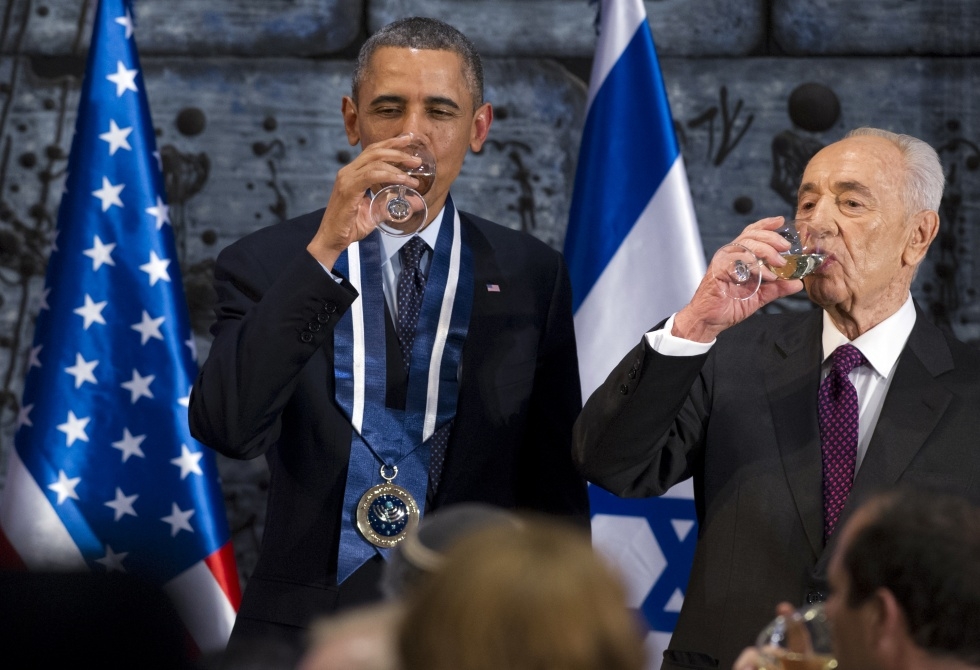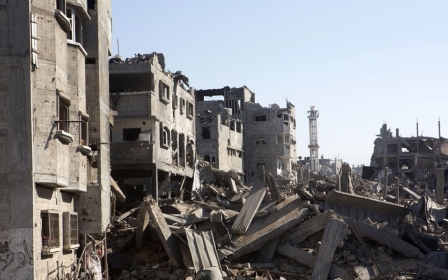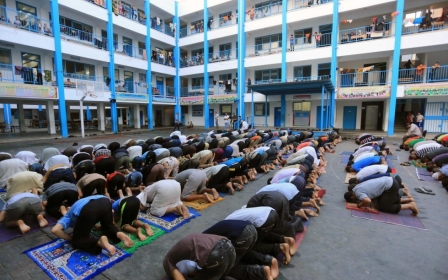Pass the salt, Obama!

A photograph circulated during President Obama’s 2008 campaign has become popular once again. It’s a picture of Obama, in his Chicago days, sharing a meal with Edward Said, Rashid Khalidi and Ali Abunimah - taken probably sometime in the mid-1990s.
This time around, the picture is being circulated by those who want to condemn the atrocities Israel is perpetrating and Obama for remaining silent in the face of it. Just the fact that Obama - or a picture of him - can serve the interests of two existentially opposed camps speaks volumes. And the stories of those sharing a meal with him in the photograph tell an illuminating story of America’s trials and tribulations with the problem of Israel.
I attended an Edward Said speech once in Casa Italiana in New York, in March 2003, six months before his death, and shortly before the US invaded Iraq. It was a year after the occupation of Afghanistan, the preparations for the invasion of Iraq were on their way and the last few scenes were being played out in the UN, which had become a theatre to this sham.
The event that occasioned the talk in the midst of all that bleakness was the jubilee of Said’s book Orientalism. It was possible to see Said chanting slogans in a square in New York one day, and in an academic setting living up to every bit of his image as “the salt of the earth”. Said’s image of standing up to Israeli soldiers, despite his 60-something years, in his documentary about Palestine is burned into our brains. Not to mention, the iconic image of Said throwing stones in the direction of Israeli soldiers in southern Lebanon.
In short, he was unique. In his last 11 years, Said drew attention to a “modern religion” he called “American Zionism”, which, he wrote, was made possible in the space carved by the events of 9/11. This was something that transcended beyond the Israel lobby that had been operating efficiently in America for many years. Said, who gave all the warnings of it, would not live to see how “American Zionism” operated during the Bush years.
The second person in the picture, Rashid Khalidi, is a scholar who is known for his seminal work in the history of the Middle East. He belonged to Obama’s inner circles, so much so that Obama, during his 2008 campaign, said that Khalidi was one of the “consistent reminders to me about my own blind spots and my own biases … It’s for that reason that I am hoping that, for many years to come, we continue that conversation - a conversation that is necessary not just around Mona and Rashid’s dinner table but around this entire world.” Obama’s praise for Khalidi had left him vulnerable to the terror attacks of both the academia and media outlets of the Israel lobby.
The last person in photograph, Ali Abunimah, is the American born son of a displaced Palestinian family by Israeli occupation. Abunimah, who is substantially younger than the other two, is an intellectual and activist. He was a sought after media personality in America, especially in the beginning of the 2000s during Sharon’s assault on Palestine. Of course, this did not last long. Abunimah was one of those who had to pay the price of American Zionism that took residence after 9/11.
‘Affirmative action’
The photograph in question is almost unimaginable for an American president. In other words, it is just as difficult to explain how a president who has shared a meal with these people can follow such policies, as it is to explain how an American president could share a meal with these three people. It is at this point that American Zionism’s strong networks in the middle of Washington’s vicious cycles of political finances enter the picture.
The most significant name in the photograph, however, is Obama himself, who signifies a complex blend of American history, governmentality and social imagination. Nevertheless, the fact the signifier stands for such a complex blend of a signified does not necessarily mean that the relationship between the signifier and the signified is strong, or real, for that matter. As it has become painfully clear in the last six months, Obama was nothing but a moment of colorful “affirmative action” at time when America needed a kernel of hope to hold onto when the post-9/11 trauma had reached its peak in and out of the States.
Obama came to power during the Gaza massacre. On 27 December 2008, Israel, in the middle of Turkish mediated peace talks with Syria, suddenly began to bomb Gaza. Israel knew very well that they could take advantage of America being in between presidents until the inauguration on 20 January 2009. They were right. Obama remained a spectator to the bombing, claiming that he had not yet taken office. That he had not taken office yet did not seem to stop him from condemning the bombings in Bombay that very same month. Israel stopped its campaign of massacres precisely two days before Obama’s inauguration on 18 January. In terms of foreign policy, Obama was as effective as a president in his six years in office, as he was as president elect during the 77days between 8 November 2008 and 20 January 2009.
Until 9/11, American Zionism was a dirty weapon America used occasionally. After 2001, however, there are serious doubts to about who has the upper hand in this relationship. America, which is still an empire despite all of its problems, will have a hard time accommodating this relationship in the future, just as it did with the neocons. If Obama were to leave the last word to Khalidi who he believed reminded him his biases:
“I had low expectations and my low expectations were more than fulfilled. He’s done considerably worse than I would have expected. But I never assumed that this would be someone who would be able to break the whole mold of American politics. And he didn’t. Quite the contrary. This has been an administration that on certain key issues has been almost as bad as, and sometimes even worse, than the Bush administration.”
It is not clear just what were Khalid’s low expectations. However, it would be a safe bet to say that Khalidi probably did not expect Obama, who shared a meal with him, Said and Abunimah, would mingle with the cheering crowds on the hillside of Sderot as they grossly and cheerfully watched the massacre in Gaza.
- Taha Ozhan is the president of SETA Foundation at Ankara. He is an academic, writer and columnist for Star Daily and Daily Sabah. He appears on weekly political debate show on national TV. He frequently comments and writes for international media. His latest book, Normalization Pains (2014), was about Kurdish issue.
The views expressed in this article belong to the author and do not necessarily reflect the editorial policy of Middle East Eye.
Photo credit: Israeli President Shimon Peres (R) and US President Barack Obama drink wine during a toast (AFP)
New MEE newsletter: Jerusalem Dispatch
Sign up to get the latest insights and analysis on Israel-Palestine, alongside Turkey Unpacked and other MEE newsletters
Middle East Eye delivers independent and unrivalled coverage and analysis of the Middle East, North Africa and beyond. To learn more about republishing this content and the associated fees, please fill out this form. More about MEE can be found here.





